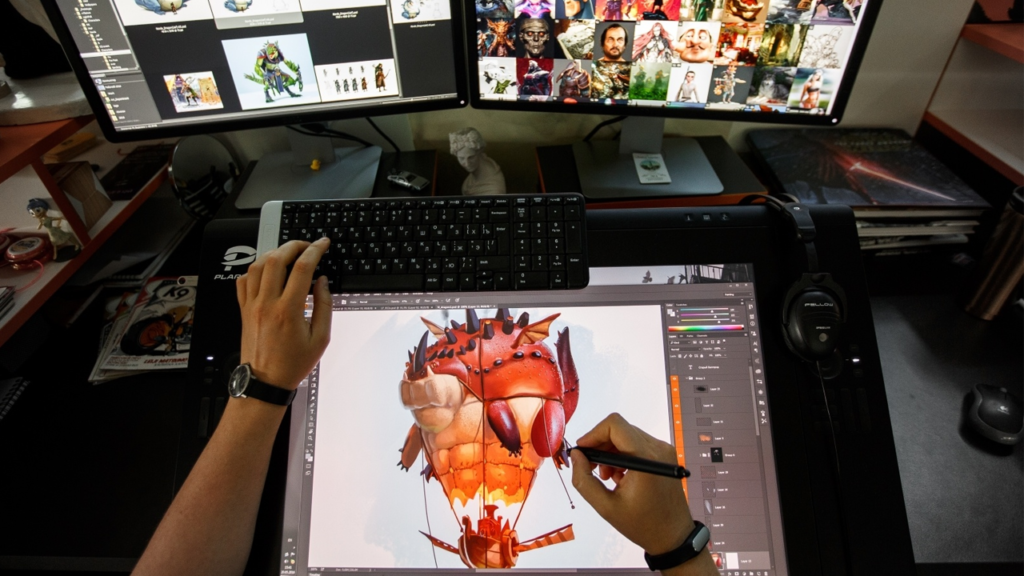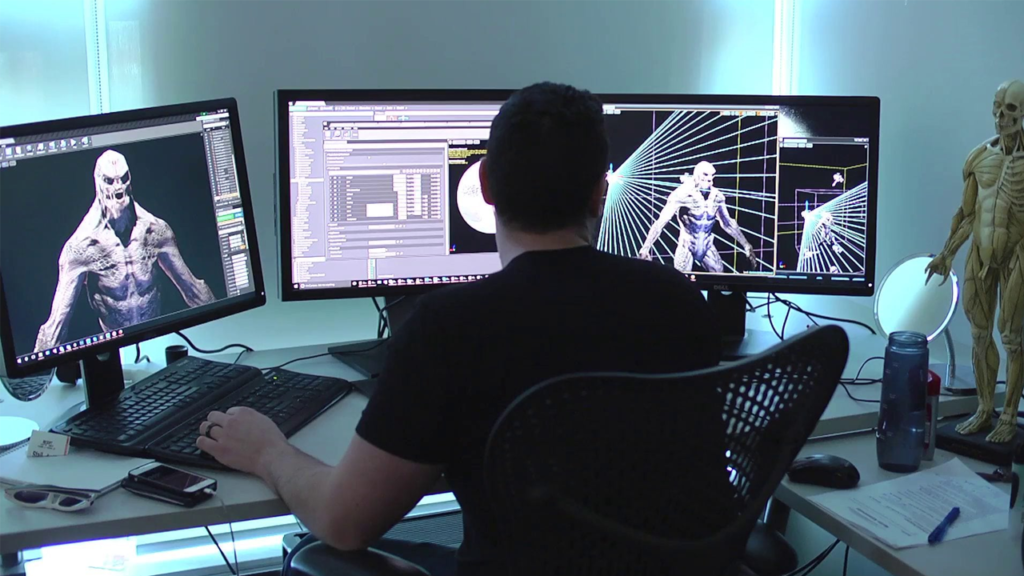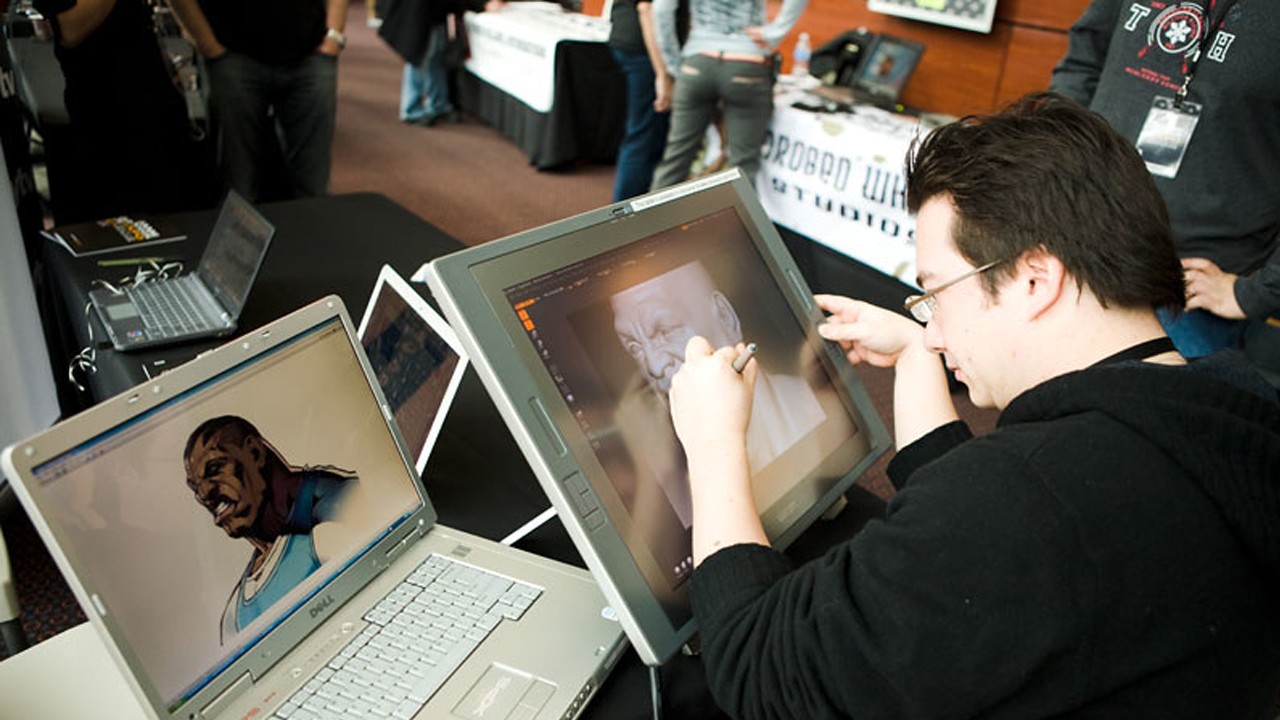Embarking on a journey through the vibrant and ever-evolving world of game development opens doors to a plethora of career opportunities. With a degree in game development, the digital realm becomes your playground, offering a canvas to not only entertain but innovate. But what specific roles can you dive into? From crafting intricate virtual worlds to shaping the narratives that captivate millions, this guide explores the diverse and dynamic jobs that await you in the game development industry.
Game Programmer and Engineer Roles
A degree in game development opens the door to a range of exciting career paths, among which game programmer and engineer roles stand out as foundational and highly sought after. These professionals are tasked with bringing game designers’ visions to life, translating storyboards and designs into playable, engaging experiences. A game programmer’s work is deeply rooted in coding, requiring proficiency in multiple programming languages such as C++, Python, and Java. Meanwhile, game engineers often delve deeper into the technical aspects, focusing on game physics, graphics, and performance optimization to ensure smooth and immersive gameplay.
Given the complexity of modern games, specialization within programming and engineering is common. Some may focus on artificial intelligence, crafting the logic that drives non-player character (NPC) behavior, while others might specialize in network programming to enable seamless online multiplayer experiences. Additionally, the rise of virtual and augmented reality has created a niche for programmers and engineers who can navigate these immersive technologies, pushing the boundaries of traditional game development.
For those passionate about problem-solving and eager to stay on the cutting edge of technology, game programming and engineering offer fulfilling career opportunities. Success in this field requires not only technical skills but also creativity, teamwork, and a continuous learning mindset to adapt to the industry’s rapid evolution.
| Specialization | Skills Required | Typical Responsibilities |
|---|---|---|
| AI Programming | Proficiency in C++, problem-solving, understanding of AI principles | Developing NPC behaviors, pathfinding algorithms, and game logic |
| Network Programming | Knowledge of network protocols, C#/Java, multiplayer server logic | Implementing multiplayer features, optimizing network performance |
| Gameplay Programming | C++, Python, creativity, understanding of game design principles | Translating game design into code, creating game mechanics |
| Graphics Programming | Strong math skills, proficiency in graphics APIs, C++ | Developing and optimizing game visuals and effects |
| VR/AR Development | Experience with Unity or Unreal Engine, C#, understanding of VR/AR principles | Creating immersive virtual/augmented reality experiences |
Exploring the landscape of game programmer and engineer roles further, it’s clear that these positions are pivotal in the game development process. The work of these professionals not only defines the technical quality of a game but also significantly influences the player’s experience. As the gaming industry continues to expand and diversify, the demand for skilled programmers and engineers is expected to grow. This creates a dynamic and promising job market for those with a game development degree, offering a variety of paths to specialize in and excel at. The journey from conceptualizing a game to bringing it to market is complex and requires a harmonious blend of art, design, and technical prowess, with programmers and engineers being key players in this intricate process.
Unlock Your Future: What Jobs Can You Get With a Game Development Degree
Embarking on a career in game development opens a myriad of doors for innovative and tech-savvy individuals. A degree in game development not only equips you with a deep understanding of software engineering and computer graphics but also instills a robust set of design and storytelling skills. This unique combination of technical and creative prowess is highly sought after in various industries, far beyond the confines of traditional game development companies.
First and foremost, the most direct path for game development graduates is becoming a Game Designer or Developer. In these roles, you’re at the heart of game creation, turning concepts into engaging gameplay experiences. However, the skills acquired during your degree can also lead to opportunities in virtual reality (VR) and augmented reality (AR) development. These emerging technologies are not only revolutionizing the gaming industry but are also being applied in fields like healthcare, education, and real estate, for training, simulations, and interactive experiences.
Beyond the gaming industry, your expertise in interactive software development is invaluable in the app development sector. Whether it’s mobile apps, web applications, or even software solutions for businesses, the principles of user engagement and interface design you’ve mastered are directly applicable. Additionally, the narrative and world-building skills honed through game development can set you apart in animation and film production, particularly in storyboard development and visual effects (VFX).
Moreover, the rise of gamification in non-gaming contexts, such as education and corporate training, opens up roles for game developers as Instructional Designers. Here, the challenge lies in making learning experiences as engaging as games, a task that requires both creativity and technical aptitude. Lastly, the analytical skills developed through programming and game testing are highly relevant in the realm of Quality Assurance (QA), not just in games but in software development at large.
- Game Designer/Developer
- VR/AR Developer
- App Developer
- Animator or VFX Specialist
- Instructional Designer
Each of these career paths benefits from a game development degree’s emphasis on problem-solving, creativity, and technical skill. Whether you’re crafting the next blockbuster game or developing VR training simulations for surgeons, the foundation laid by your education is both versatile and valuable. As technology continues to evolve, so too will the opportunities for game development graduates, making it a field ripe with potential for those passionate about creating immersive, engaging experiences.
Careers in Game Design and Storytelling

The realm of game development is as expansive as the universes it creates, offering a wide range of career opportunities for those passionate about bringing stories to life. With a degree in game development, you’re not just limited to coding or programming; you can embark on a journey to become a pivotal part of the storytelling aspect in games. This involves roles that blend creative writing with technical skills, ensuring that the narrative elements are not just compelling, but are also seamlessly integrated into the gameplay.
At the heart of every memorable game is a story that captivates and engages its audience. This is where game designers and narrative designers come into play. As a game designer, you’ll have the opportunity to shape the game’s world, character development, and plot progression. Your role is crucial in creating an immersive experience that players can connect with on a deep level. Meanwhile, narrative designers focus more on the storytelling aspect, working closely with writers and game designers to weave the narrative through the gameplay. This might involve drafting storylines, creating dialogue, and developing backstories that enrich the game’s universe. The collaboration between these roles ensures that the story and gameplay enhance each other, making the game more enjoyable and meaningful to players.
For those with a knack for visual storytelling, becoming a cinematics designer is another exciting pathway. This role involves creating the cinematic sequences that drive the game’s narrative forward, requiring a blend of technical skills in animation and a creative understanding of storytelling. These professionals play a vital role in bridging the gap between the game’s narrative and the gameplay, ensuring that each cinematic piece contributes to the overall experience of the player.
Expanding Horizons in Game Design and Storytelling
The scope for professionals in game design and storytelling is continually expanding, thanks to the increasing complexity of video games and the demand for more engaging and intricate narratives. This evolution opens up new avenues for creative expression and innovation within the industry, making it an exciting time to be part of this field. Whether you’re crafting the next big open-world adventure or a poignant, narrative-driven indie game, your work in game design and storytelling is key to creating memorable gaming experiences.
As the gaming industry grows, so does the need for diverse and compelling stories that resonate with a wide audience. This demand creates a welcoming space for voices from various backgrounds to contribute to the richness of game narratives, highlighting the importance of inclusivity and diversity in storytelling. The future of game design and storytelling looks promising, offering endless possibilities for those ready to take on the challenge.
| Role | Responsibilities | Key Skills |
|---|---|---|
| Game Designer | Designing gameplay mechanics, creating game rules, and environment design. | Creativity, Problem-solving, Technical writing |
| Narrative Designer | Developing narrative content, writing dialogue, and integrating story with gameplay. | Storytelling, Communication, Collaboration |
| Cinematics Designer | Creating cinematic sequences that advance the game’s plot and enhance emotional engagement. | Animation, Visual storytelling, Technical proficiency in cinematic tools |
| Level Designer | Designing game levels, scripting events, and balancing difficulty to improve player experience. | Attention to detail, Creativity, Understanding of player psychology |
| Writer | Writing storylines, dialogue, and background lore to build the game’s world. | Creative writing, Research, Adaptability |
Opportunities in Game Art and Animation
The realm of game art and animation offers a plethora of opportunities for individuals equipped with a game development degree. This dynamic field merges creativity with technology, allowing artists and animators to bring imaginative worlds to life. With the gaming industry’s continuous growth, the demand for skilled professionals in game art and animation has surged, opening doors to diverse career paths.
Game artists and animators play a critical role in the development process, shaping the visual elements that define a game’s aesthetics and storytelling. From crafting detailed character designs to developing immersive environments, these professionals utilize their artistic skills and technical knowledge to create compelling content that captivates players. Moreover, advancements in technology and software have broadened the scope of what can be achieved, making now an exciting time to enter the field.
Collaboration is key in this industry, as game artists and animators work closely with game designers, programmers, and other team members to ensure that the visual aspects align with the game’s objectives and gameplay mechanics. This interdisciplinary approach not only enhances the gaming experience but also fosters a creative and innovative work environment.
| Position | Responsibilities | Skills Required |
|---|---|---|
| Character Artist | Designing and modeling characters | Strong drawing abilities, 3D modeling, and texturing |
| Environment Artist | Creating background and landscapes | 3D modeling, spatial design, and a keen eye for detail |
| UI/UX Designer | Designing user interfaces and experiences | Graphic design, user research, and interaction design |
| Technical Artist | Bridging the gap between artists and programmers | Artistic skills, programming knowledge, and problem-solving |
| Animator | Animating characters and elements | Understanding of motion, timing, and storytelling |
Quality Assurance and Testing Positions

Embarking on a career in game development opens the door to a myriad of opportunities, among which Quality Assurance (QA) and Testing roles stand out for their critical importance in the game development lifecycle. QA roles are not just about finding bugs; they are about ensuring the quality and playability of the game, providing feedback to the development team, and ultimately ensuring a satisfying user experience. A degree in game development equips candidates with a deep understanding of game mechanics, development processes, and user experience principles, making them ideal for these positions.
Those in QA and Testing positions play a pivotal role in the development cycle, working closely with developers to identify, report, and track bugs. Additionally, they are involved in creating test cases and scenarios to ensure thorough coverage of all game aspects. Their work ensures that games are not only bug-free but also aligned with the vision of the game designers and expectations of the players. The skills honed in a game development degree, such as critical thinking, attention to detail, and a solid understanding of software development and game design, are directly applicable and highly valued in these roles.
Advancements in technology and methodologies in game development have also introduced more specialized roles within QA and Testing, such as Automation Testing, Performance Testing, and Security Testing, further expanding the career prospects for game development graduates in this domain.
Exploring the Spectrum of QA Roles in Game Development
In the realm of Quality Assurance and Testing, professionals can explore a spectrum of roles that cater to different aspects of game testing. From traditional QA testers who manually play through games to identify errors, to specialists in automation who develop scripts to automate the testing process, the field is vast and varied. This diversity in roles allows individuals to find their niche based on their interests and skills, whether it be in detailed manual testing, creating innovative automated tests, or focusing on specific testing types like performance or security.
| Role | Focus Area | Required Skills |
|---|---|---|
| QA Tester | Manual Testing | Attention to detail, patience, thorough understanding of gameplay mechanics |
| Automation Tester | Test Automation | Programming skills, knowledge of automation tools, analytical skills |
| Performance Tester | Game Performance | Understanding of game engines, analytical skills, problem-solving |
| Security Tester | Game Security | Knowledge of cybersecurity principles, ethical hacking, diligence |
| Localization Tester | Cultural Appropriateness | Fluency in multiple languages, cultural awareness, attention to detail |
Emerging Fields: VR and AR Development
With the rapid evolution of technology, the fields of Virtual Reality (VR) and Augmented Reality (AR) have emerged as groundbreaking frontiers in the gaming industry. These technologies are not just reshaping entertainment but are also revolutionizing education, healthcare, and real estate, among others. Holding a degree in game development can be your ticket to entering these vibrant sectors, where the demand for innovative experiences is growing exponentially. The skills acquired during your studies, such as 3D modeling, interactive design, and programming, are directly applicable to VR and AR development.
Moreover, the advent of affordable VR and AR hardware has made these technologies accessible to a wider audience, opening up new markets and opportunities for developers. In the realm of gaming, VR offers an immersive experience that traditional games cannot match, while AR brings digital elements into our real-world environment, offering a unique blend of reality and virtuality. As these technologies continue to evolve, the potential for creative and innovative applications is virtually limitless, making this an exciting time to be involved in VR and AR development.
| Technology | Application | Industry Impact |
|---|---|---|
| VR | Gaming | Creates immersive gaming experiences |
| AR | Education | Enhances learning with interactive content |
| VR | Healthcare | Assists in therapy and rehabilitation |
| AR | Real Estate | Enables virtual property tours |
| VR | Training | Simulates real-world scenarios for practice |
Entering the fields of VR and AR development opens a world of possibilities for game development graduates. These technologies are not only redefining the way we play games but are also having a profound impact on various sectors by offering immersive and enhanced experiences. As businesses continue to explore the potential of VR and AR, the demand for skilled developers in these areas is expected to rise. This presents a unique opportunity for those with a game development degree to be at the forefront of technological innovation and to play a key role in shaping the future of digital interaction.
As we conclude, it’s evident that the fields of VR and AR development offer a promising career path for game development graduates. The skills required for success in these areas are both challenging and rewarding, with the potential to impact numerous industries positively. If you’re passionate about pushing the boundaries of what’s possible and creating experiences that captivate and amaze, then a future in VR or AR development could be the perfect fit for you. The door to this exciting future is wide open, and now is the time to step through it.

Is a game developer and writer with over seven years of experience in the gaming industry. Specializing in game design, development trends, and emerging technologies. He has worked on indie game projects and larger development teams, sharing his insights to help aspiring developers navigate the evolving world of game creation. Ethan’s articles focus on practical tips, game mechanics, and tools to inspire creativity in the gaming community.






